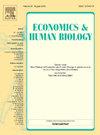Religiosity, attitudes toward science, and public health: Evidence from Finland
IF 1.8
3区 医学
Q2 ECONOMICS
引用次数: 0
Abstract
We explore how religiosity influences perceptions and the adoption of protective health behaviours, as reflected in COVID-19 infection and vaccination rates. In the first part of our analysis, we use Finnish data from four nationally representative surveys, we find that individuals with higher self-reported religiosity and those from more conservative religious groups tend to hold less favourable attitudes towards science, technology and medicine, compared to non-religious individuals. In the second part, we observe that municipalities with higher shares of conservative religious groups experienced greater COVID-19 spread and lower vaccination rates, with these trends persisting throughout the pandemic. Our findings underscore the importance of accounting for religiosity when crafting public health policies, as it may contribute to the existence of non-compliance hotspots.
宗教信仰、对科学的态度和公共健康:来自芬兰的证据。
我们探讨了宗教信仰如何影响观念和采取保护性健康行为,这反映在COVID-19感染率和疫苗接种率上。在我们分析的第一部分中,我们使用了来自四个全国代表性调查的芬兰数据,我们发现,与非宗教人士相比,自我报告的宗教虔诚度较高的个人和来自更保守的宗教团体的个人倾向于对科学、技术和医学持不太有利的态度。在第二部分中,我们观察到,保守宗教团体比例较高的城市,COVID-19的传播更大,疫苗接种率更低,这些趋势在整个大流行期间持续存在。我们的研究结果强调了在制定公共卫生政策时考虑宗教信仰的重要性,因为它可能导致不遵守热点的存在。
本文章由计算机程序翻译,如有差异,请以英文原文为准。
求助全文
约1分钟内获得全文
求助全文
来源期刊

Economics & Human Biology
医学-公共卫生、环境卫生与职业卫生
CiteScore
4.50
自引率
12.00%
发文量
85
审稿时长
61 days
期刊介绍:
Economics and Human Biology is devoted to the exploration of the effect of socio-economic processes on human beings as biological organisms. Research covered in this (quarterly) interdisciplinary journal is not bound by temporal or geographic limitations.
 求助内容:
求助内容: 应助结果提醒方式:
应助结果提醒方式:


